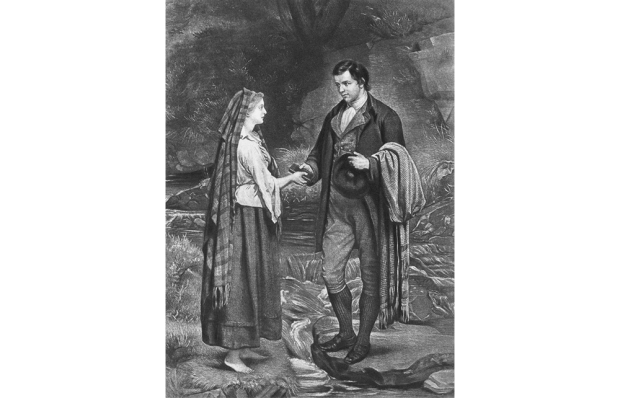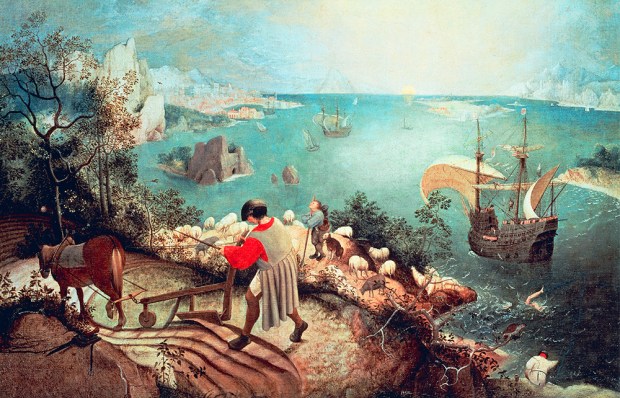In Competition No. 3214, you were invited to choose a well-known painted portrait and let the subject speak for itself, in poetry or prose.
Among those who seized the opportunity to have their say were pre-Raphaelite poster girl Lizzie Siddal, who fell dangerously ill while spending several months floating in a tin bath for Millais’s 1852 ‘Ophelia’; David Hockney’s Mr and Mrs Clark (and their cat Percy); Franz Hals’s ‘Laughing Cavalier’; and ‘Weeping Woman’ Dora Maar (‘All his portraits of me are lies. They’re Picassos. Not one is Dora Maar,’ she once told the American writer James Lord.)
The challenge drew a modestly sized but accomplished entry and in another hotly contested week, honourable mentions go to Nicholas Lee, P.C. Peirse-Duncombe and Chris O’Carroll. The winners, printed below, are rewarded with £30 each.
The longshanks with the distant look, that’s me,
A nervous fugitive from the settee
Caught in mid-stride, fingering my moustache,
While Fanny, radiant with light, must squash
Against the painting’s edge, where, duly sprawled,
She prophesies I’ll wear the carpet bald.
My mind is restless, too, a snuffling hound.
Fanny and I are separate, yet so bound
We might be one. Could one also be two,
But in antagonism, or askew?
I’ll parse that notion later, but meanwhile
I dwell on Fanny’s steadfastness and smile.
Between us, centred, is an open door
Disclosing stairs, and what’s a staircase for?
Sargent’s inviting highlights point the way
To where conjugal bliss is no cliché.
Basil Ransome-Davies/‘Robert Louis Stevenson and His Wife’ by John Singer Sargent
So, an Arrangement: that is how you see your Mother. Granted, traditional portraiture’s fixation with personhood is vulgar and a certain austerity about the picture is in accord with my Episcopalian principals. True, there were times during the awful tantrums of your Connecticut childhood when one longed simply to become part of the scenery. One never sought to be painted quite so literally into a corner, however. That this Arrangement should be ostensibly in grey and black, too, demonstrates admirable restraint, markedly contrasting with the aesthetic profligacy of those rainbow daubs Father and I felt constrained fulsomely to admire when first you discovered oils. One cannot quarrel with the abstract geometry of the picture, only with the filial piety of its artist. Also, it will be for the sitter to decide if further Arrangements are to be painted. One rather suspects not.
Adrian Fry/‘Arrangement in Grey and Black No. 1’ by Whistler
Levantine, would you say? Observe my ear-ring:
I’m straight as a die. I love my ladies dark.
My Mona Lisa look, find that endearing?
I put it on, like most acts, for a lark —
My sober dress, my barber’d beard, that hair
So slightly wild … they do not form a whole —
My gaze suggests I might be foul or fair,
Or maybe that there’s mildew in my soul.
You guess my name. But is that who I am?
Too tidy for a scrivener or scribbler,
It looks as if I might just give a damn!
I’ve not the inky fingers of a quibbler.
Or do I stare right through you, make you tremble?
That’s me, you get my message: I dissemble.
Bill Greenwell/The ‘Chandos’ portrait of Shakespeare
I am the very model of a modern noble Florentine,
I sit with folded hands demure, my smile is faintly serpentine,
I told Leonardo to paint fast and yet he took an age or so,
I’d rather have been sculpted by that foxy Michelangelo,
I star in every tourist’s shot, it’s always pandemonium,
They cannot know the nights I’ve spent, some off my head on opium,
my husband never paid the fee, he said it wasn’t my best side,
to show the depth of my regard I laced his wine with cyanide,
of lusty lovers north and south I had a mighty panoply,
now I’m the treasured babe of France, six million see me annually,
I lounge upon the Louvre wall behind thick glass that’s bullet-proof,
an enigmatic, pensive sphinx, untouchable, remote, aloof,
I’m valued far above the works of Titian and Masaccio,
yet I taught the Medici and the Borgias everything I know,
so watch as my eyes follow you in eerie, painted nonchalance,
I am the queen of knowing smirks, the schemer of the Renaissance.
Janine Beacham/‘Mona Lisa’ by Leonardo
If I should die think that I sat
In far Berlin in barrowed hat
Too young to know how best to write
Of tragedies when humans fight.
Look on this youth, remember me;
I still have honey for my tea
And when I leave the artist’s seat
I’ll walk through woodlands in bare feet
And write of lanes where once I roved
And fondly say: These I have loved.
This Cambridge youth with hair of gold
Will smile for ever, won’t grow old,
Will savour life in naked stream
And time will always be a dream.
Although for you the minutes fly
They stop for me, dear passer-by. Frank McDonald/‘Rupert Brooke’ by Clare Ewald
NO. 3217: IN THE SOUP
In Katherine Mansfield’s short story ‘Bliss’, a poet quotes ‘an incredibly beautiful line’ of poetry: ‘Why must it always be tomato soup?’ You are invited to supply a poem (maximum 16 lines) which either beginsor ends with that line. Please email entries to lucy@spectator.co.uk by midday on 15 September.
Got something to add? Join the discussion and comment below.
Get 10 issues for just $10
Subscribe to The Spectator Australia today for the next 10 magazine issues, plus full online access, for just $10.
You might disagree with half of it, but you’ll enjoy reading all of it. Try your first month for free, then just $2 a week for the remainder of your first year.














Comments
Don't miss out
Join the conversation with other Spectator Australia readers. Subscribe to leave a comment.
SUBSCRIBEAlready a subscriber? Log in